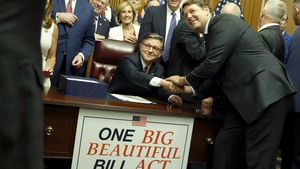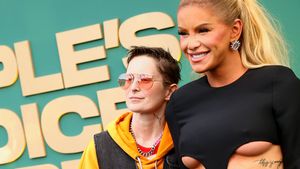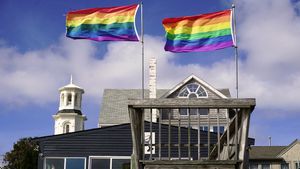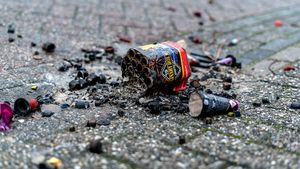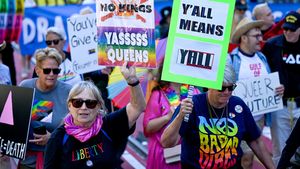Clutch those pearls, boys and girls, conventional wisdom has once again been proven to be neither conventional nor wisdom.
Here it is, in black and white (well, electrons anyway): science has proven that receiving the HPV vaccine or getting on PrEP does not, despite the claims from the Chicken Littles of sexual policing, increase risky behavior.
Let me repeat that: Getting an HPV vaccine or selecting pre-exposure prophylaxis (PrEP) as a prevention tool does not suddenly transform a person into an insatiable sex machine.
When Truvada as PrEP was first approved by the Food and Drug Administration, and the Centers for Disease Control and Prevention made recommendations on when and how to prescribe it to men who have sex with men (and subsequently all high risk groups in the U.S.), the first phase of push back came from gay critics who argued that users would simply throw away all their condoms and indiscriminately be penetrated by every Tom, Dick, and Harry available.
So researchers deconstructed the ground-breaking iPrEx study, which was the first to establish that daily dosing with the brand name drug Truvada (which is PrEP) could prevent new infections. They were looking for evidence of what scientists politely called "sexual risk compensation," and the naysayers called "Truvada slutting." Basically, they were looking to see if using PrEP made
Their study, released on Dec. 18, concluded, "There was no evidence of sexual risk compensation in iPrEx." In other words, researchers saw no increase in syphilis cases, or HIV cases, and found less engagement in receptive anal sex.
Kyle Murphy, assistant director of communications over at the National Minority AIDS Council, had this to say about the study: “This study further confirms the original findings of iPrEx, which indicated not only that PrEP is a safe and effective tool for reducing HIV transmission, but also that it reduced so-called risk behavior. Hopefully fears around potential risk compensationcan now be put to rest and our community can focus instead on how best to scale up this exciting intervention. Infections continue to rise among gay and bisexual men, especially young black gay men and we should be utilizing every tool at our disposal to reverse that trend.”
 And blogger Jake Sobo (a pen name), who is also on PrEP, had this to say: “Ever since the FDA approved PrEP, baseless critics have been alleging that taking Truvada for PrEP was somehow going to make people engage in 'risk compensation' and stop using condoms. We've heard this time and time again with other HIV interventions, like male circumcision. And time and time again, studies come out that show (surprise!) there's not even a kernel of truth to back it up. When it comes to HIV interventions, risk compensation is a theory without a shred of evidence to support it. Indeed, the new UCSF study adds to the mountain of evidence that unequivocally rebukes it. In most scientific fields, we'd say a useless theory should be thrown in the garbage. But in HIV prevention, we just can't seem to let it go. It's time we once and for all recognized risk compensation for what it is: a moral attack on sex-related interventions. Let's call a spade a spade: many people don't want those at risk to get access to PrEP because they believe if you have sex you should be punished. This debate over risk compensation was never really about science.”
And blogger Jake Sobo (a pen name), who is also on PrEP, had this to say: “Ever since the FDA approved PrEP, baseless critics have been alleging that taking Truvada for PrEP was somehow going to make people engage in 'risk compensation' and stop using condoms. We've heard this time and time again with other HIV interventions, like male circumcision. And time and time again, studies come out that show (surprise!) there's not even a kernel of truth to back it up. When it comes to HIV interventions, risk compensation is a theory without a shred of evidence to support it. Indeed, the new UCSF study adds to the mountain of evidence that unequivocally rebukes it. In most scientific fields, we'd say a useless theory should be thrown in the garbage. But in HIV prevention, we just can't seem to let it go. It's time we once and for all recognized risk compensation for what it is: a moral attack on sex-related interventions. Let's call a spade a spade: many people don't want those at risk to get access to PrEP because they believe if you have sex you should be punished. This debate over risk compensation was never really about science.”
Ain't that the truth?
But risk compensation seems not to have disappeared from our science minded friends. Evidently, a growing chorus of naysayers have been trashing the HPV vaccine because it will lead to teen sex. Here I thought teen sex was a result of teenagers with hormones getting together and having sex.
A new study, released in the March issue of Pediatrics, puts that claim down for the count. Here's how the USA Today (republished in the Detroit Free Press) explained the study and outcomes: Among the 339 participants, both sexually experienced and inexperienced, ages 13-24, “the vast majority thought it was still important to practice safe sex after vaccination, and most did not believe that HPV vaccination protected against other STIs,” said [Jessica] Kahn.
“This study, in combination with others, offers pretty convincing evidence that vaccination does not lead to riskier behaviors, and that should be reassuring to parents” who have cited that concern in rejecting what is a “very safe and effective” vaccinatiion, she added.
Both studies should put the naysayers to bed without dinner. Unfortunately, as long as sex is being shamed and moralized in the U.S., anything which will remove disease barriers, and thus fear of sex, will be shamed by the cadre of people who still want sex to have some grand moral design to it, instead of being exactly what it is: a human function.

 And blogger Jake Sobo (a pen name), who is also on PrEP, had this to say: “Ever since the FDA approved PrEP, baseless critics have been alleging that taking Truvada for PrEP was somehow going to make people engage in 'risk compensation' and stop using condoms. We've heard this time and time again with other HIV interventions, like male circumcision. And time and time again, studies come out that show (surprise!) there's not even a kernel of truth to back it up. When it comes to HIV interventions, risk compensation is a theory without a shred of evidence to support it. Indeed, the new UCSF study adds to the mountain of evidence that unequivocally rebukes it. In most scientific fields, we'd say a useless theory should be thrown in the garbage. But in HIV prevention, we just can't seem to let it go. It's time we once and for all recognized risk compensation for what it is: a moral attack on sex-related interventions. Let's call a spade a spade: many people don't want those at risk to get access to PrEP because they believe if you have sex you should be punished. This debate over risk compensation was never really about science.”
And blogger Jake Sobo (a pen name), who is also on PrEP, had this to say: “Ever since the FDA approved PrEP, baseless critics have been alleging that taking Truvada for PrEP was somehow going to make people engage in 'risk compensation' and stop using condoms. We've heard this time and time again with other HIV interventions, like male circumcision. And time and time again, studies come out that show (surprise!) there's not even a kernel of truth to back it up. When it comes to HIV interventions, risk compensation is a theory without a shred of evidence to support it. Indeed, the new UCSF study adds to the mountain of evidence that unequivocally rebukes it. In most scientific fields, we'd say a useless theory should be thrown in the garbage. But in HIV prevention, we just can't seem to let it go. It's time we once and for all recognized risk compensation for what it is: a moral attack on sex-related interventions. Let's call a spade a spade: many people don't want those at risk to get access to PrEP because they believe if you have sex you should be punished. This debate over risk compensation was never really about science.” 














































